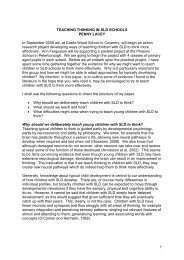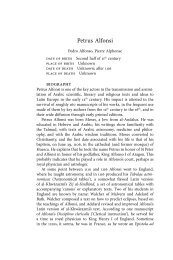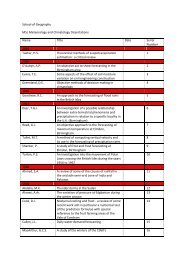reimagining-abstracts - University of Birmingham
reimagining-abstracts - University of Birmingham
reimagining-abstracts - University of Birmingham
Create successful ePaper yourself
Turn your PDF publications into a flip-book with our unique Google optimized e-Paper software.
aristocratic ideology as Nyota, his Masai warrior associate, who is explicitly<br />
compared to a Dorian. Both Andreas and Nyota clash with the colonial regime, and<br />
Andreas’ attitude towards the Africans is felt by them to be typically different from<br />
the behaviour <strong>of</strong> the colonizers: Greeks are different.<br />
In this way, the Dorian component <strong>of</strong> Greek identity is highlighted in both<br />
novels as the part that stands for permanent rebellion against an oppressive society,<br />
even though the ideological framework <strong>of</strong> the two novels is very different.<br />
Rowena Fowler<br />
Plato, Seferis and Heaney: Poetry as redress<br />
The nekyia, talking with the dead, is a familiar metaphor in classical reception.<br />
Conjuring a shade is an attempt to understand the past, influence the present or see<br />
into the future, to seek guidance, reconciliation or revenge. Unlike metamorphosis<br />
(another powerful trope <strong>of</strong> reception) it is explicitly concerned with justification and<br />
knowledge. Plato, re-inventing the Homeric katabasis and nekyia, moralised the<br />
afterlife; his eschatalogical fables introduce an ethics <strong>of</strong> judgement and punishment<br />
and therefore <strong>of</strong> redress.<br />
My paper examines Seferis' «Επί ασπαλάθων» and Heaney's rejoinder, "To<br />
George Seferis in the Underworld", in the light <strong>of</strong> Heaney's essay The Redress <strong>of</strong><br />
Poetry. Acknowledging the poets' broader engagement with classical texts (in<br />
particular Seferis with Homer, Heaney with Vergil) I concentrate on their use <strong>of</strong> Plato<br />
as "the court <strong>of</strong> appeal through which poetic imagination seeks to redress whatever is<br />
wrong . . . in the prevailing conditions". I argue that a classically-inspired poetry <strong>of</strong><br />
redress will have several distinctive features: an insistence on the local, specific and<br />
topical; direct reference or address to a classical author; some engagement with the<br />
source language; a consciousness <strong>of</strong> the pressures <strong>of</strong> testimony.<br />
A hallmark <strong>of</strong> Heaney's poetics is the weaving <strong>of</strong> language back into<br />
landscape; his reading <strong>of</strong> «Επί ασπαλάθων» reveals correspondences between two<br />
national poetries. The interplay <strong>of</strong> language and political violence in Ireland gives a<br />
special edge to his understanding <strong>of</strong> Greece. Alongside his own "much-contested"<br />
political poems (e.g. "Punishment", "Whatever You Say Say Nothing"), «Επί<br />
ασπαλάθων» strikes him as dangerously unequivocal, lacking any shade <strong>of</strong> doubt.<br />
However, Heaney's reservations about declarative utterance should not be read as a<br />
reproach to Seferis (as some have argued) but as a surprised awareness <strong>of</strong> the two<br />
poets' dissimilar uses <strong>of</strong> a classical authority.<br />
Bruce W. Frier<br />
The ‘New Hellenism’ <strong>of</strong> Constantine Cavafy<br />
In an earlier paper, I tried to explain Constantine Cavafy’s fascination with the<br />
Hellenistic world during the last two centuries BCE, when the Hellenistic kingdoms<br />
were being gradually subjected to Roman rule, as a device he used to explore aspects<br />
<strong>of</strong> his own sense <strong>of</strong> marginalization as the subject <strong>of</strong> a great empire and as a<br />
homosexual – a condition in which he eventually learned to glory as a liberating<br />
intellectual force. In the present paper, I want to describe this complex reevaluation<br />
in more detail, by linking Cavafy more closely to the historiographic debates <strong>of</strong> his<br />
own time.<br />
About the depth <strong>of</strong> Cavafy’s interest in the late Hellenistic monarchies there<br />
can be no doubt. Nearly a sixth <strong>of</strong> his surviving poetry is linked to this era, and many<br />
<strong>of</strong> his best known poems – such as “Orophernes” (1904) and “Of Demetrius Soter”<br />
6







![Benyamin Asadipour-Farsani [EngD Conference abstract]](https://img.yumpu.com/51622940/1/184x260/benyamin-asadipour-farsani-engd-conference-abstract.jpg?quality=85)









